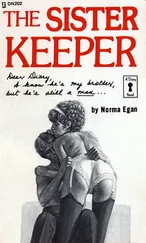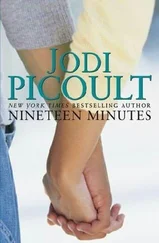All the hair stands up on the back of my neck. "Is this… a eulogy ?"
By now, Brian is crying, too. "If I don't do it now, I won't be able to when it's really time."
I shake my head. "It's not time."
I call my sister at three-thirty in the morning. "I woke you," I say, realizing the minute Zanne gets on the phone that for her, for everyone normal, it is the middle of the night.
"Is it Kate?"
I nod, even though she cannot hear that. "Zanne?"
"Yeah?"
I close my eyes, feel the tears squeeze out.
"Sara, what's the matter? Do you want me to come down there?"
It is hard to speak around the enormous pressure in my throat; truth expands until it can choke you. As kids, Zanne's bedroom and mine shared a hallway, and we used to fight about leaving the light on through the night. I wanted it burning; she didn't. Put a pillow over your head, I used to tell her. You can make it dark, but I can't make it light.
"Yes," I say, sobbing freely now. "Please."
Against all odds, Kate survives for ten days on intense transfusions and arsenic therapy. On the eleventh day of her hospitalization, she slips into a coma. I decide I will keep a bedside vigil until she wakes up. And I do this for exactly forty-five minutes, until I receive a phone call from the principal of Jesse's school.
Apparently, the metal sodium is stored in the high school science laboratory in small containers of oil, because of its volatile reaction with air. Apparently, it is water-reactive, too, creating hydrogen and heat. Apparently, my ninth-grader was bright enough to realize this, which is why he stole the sample, flushed it down the toilet, and exploded the school's septic tank.
After he is expelled for three weeks by the principal, a man who has the decency to ask after Kate while basically telling me that my eldest is destined for the State Penitentiary, Jesse and I drive back to the hospital. "Needless to say, you're grounded."
"Whatever."
"Until you're forty."
Jesse slouches, and if it is possible, his brows knit even more closely together. I wonder when, exactly, I gave up on him. I wonder why, when Jesse's history is not by any stretch as disappointing as his sister's.
"The principal's a dick."
"You know what, Jess? The world's full of them. You will always be up against someone. Something."
He glares at me. "You could take a conversation about the frigging Red Sox and somehow turn it back to Kate."
We pull into the hospital parking lot, but I make no move to shut off the car. Rain pelts the windshield. "We're all pretty gifted at that. Or were you blowing up the septic tank for some other reason?"
"You don't know what it's like being the kid whose sister is dying of cancer."
"I have a fairly good idea. Since I'm the mother of the kid who is dying of cancer. You're absolutely right, it does suck. And sometimes I feel like blowing something up, too, just to get rid of that feeling that I'm going to explode any minute." I glance down and notice a bruise the size of a half-dollar, right in the crook of his arm. There's a matching one on the other side. It is telling, I suppose, that my mind immediately races to heroin, instead of leukemia, as it would with his sisters. "What's that?"
He folds his arms. "Nothing."
"What is it?"
"None of your business."
"It is my business." I pull down his forearm. "Is that from a needle?"
He lifts his head, eyes blazing. "Yeah, Ma. I shoot up every three days. Except I'm not doing smack, I'm getting blood taken out of me on the third floor here." He stares at me. "Didn't you wonder who else was keeping Kate in platelets?"
He gets out the car before I can stop him, leaving me staring out a windshield where nothing is clear anymore.
Two weeks after Kate is admitted to the hospital, the nurses convince me to take a day off. I come home and shower in my own bathroom, instead of the one used by the medical staff. I pay overdue bills. Zanne, who is still with us, makes me a cup of coffee; it is fresh and ready when I come down with my hair wet and combed. "Anyone call?"
"If by anyone you mean the hospital, then no." She flips the page of the cookbook she's reading. "This is such bullshit," Zanne says. "There is no joy in cooking."
The front door opens and slams shut. Anna comes racing into the kitchen and stops abruptly at the sight of me. "What are you doing here?"
"I live here," I say.
Zanne clears her throat. "Contrary to appearances."
But Anna doesn't hear her, or doesn't want to. She has a smile as wide as a canyon on her face, and brandishes a note in front of me. "It was sent to Coach Urlicht. Read it read it read it!"
Dear Anna Fitzgerald,
Congratulations on being accepted into the Girls in Goal Summer Hockey Camp. This year camp will be held in Minneapolis, from July 3-17. Please fill out the attached paperwork and medical history and return by 4/30/01. See you on the ice!
Coach Sarah Tenting
I finish scanning the letter. "You let Kate go to that sleep-away camp when she was my age, the one for kids with leukemia," Anna says. "Do you have any idea who Sarah Teuting is? The goalie on Team USA, and I don't just get to meet her, I get to have her tell me what I'm doing wrong. Coach got a full scholarship for me, so you don't even have to pay a dime. They’ll fly me out on a plane and give me a dorm room to stay in and everything and nobody gets a chance like this, ever—"
"Honey," I say carefully, "you can't do this."
She shakes her head, as if she's trying to make my words fit. "But it's not now, or anything. It's not till next summer."
And Kate might be dead by then.
It is the first time I can remember Anna ever indicating that she sees an end to this time line, a moment when she might finally be free of obligation to her sister. Until that point, going to Minnesota is not an option. Not because I am afraid of what might happen to Anna there, but because I am afraid of what might happen to Kate while her sister is gone. If Kate survives this latest relapse, who knows how long it will be before another crisis happens? And when it does, we will need Anna—her blood, her stem cells, her tissue—right here.
The facts hang between us like a filmy curtain. Zanne gets up and puts her arm around Anna. "You know what, bud? Maybe we should talk about this with your mom some other time—"
"No." Anna refuses to budge. "I want to know why I can't go." I run a hand down my face. "Anna, don't make me do this.”
“Do what, Mom," she says hotly. "I don't make you do anything." She crumples the letter and runs out of the kitchen. Zanne smiles weakly at me. "Welcome back," she says.
Outside, Anna picks up a hockey stick and starts to shoot against the wall of the garage. She keeps this up for nearly an hour, a rhythmic beat, until I forget she is out there and begin to think a home might have its own pulse.
Seventeen days after Kate is admitted to the hospital, she develops an infection. Her body spikes a fever. She is pancultured—blood, urine, stool, and sputum sent out to isolate the organism—but is put on a broad-spectrum antibiotic right away in the hopes that whatever is making her sick might respond.
Steph, our favorite nurse, stays late some nights just so that I don't have to face this by myself. She brings me People magazines filched from the day surgery waiting rooms, and holds sunny onesided conversations with my unconscious daughter. She is a model of resolve and optimism on the surface, but I have seen her eyes cloud with tears as she is sponge-bathing Kate, in the moments when she doesn't think I can see her.
One morning, Dr. Chance comes in to check on Kate. He wraps his stethoscope around his neck and sits down in a chair across from me. "I wanted to be invited to her wedding."
Читать дальше












